#james flint the man that u are
Text
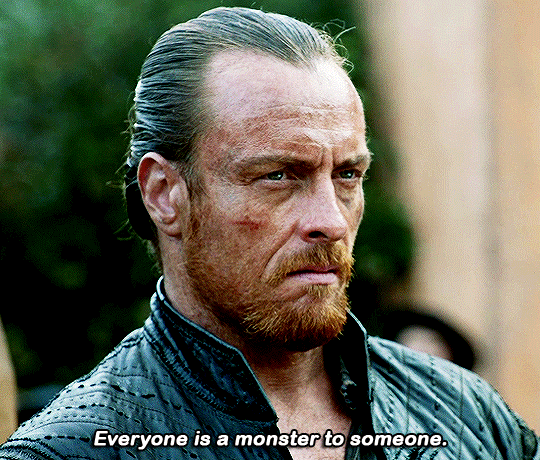

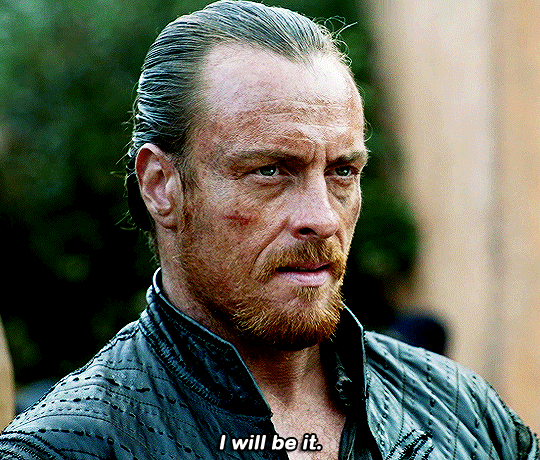
BLACK SAILS
210. XVIII
#james flint the man that u are#im blowing him a kiss#black sails#blacksailsedit#james flint#jamesflintedit#toby stephens#periodedit#perioddramaedit#tvedit#tvgifs#dailytvgifs#filmtvcentral#cinemapix#dailyflicks#smallscreensource#**#this is me reminding anyone who hasnt to watch black sails xx#show of all time the only show ever etc etc
3K notes
·
View notes
Text
i cannot explain how simultaneously complexly fascinating and deeply hilarious this fucking intimate coming out scene between flint and silver is in the s3 finale of black sails.
like. imagine you are james flint. you have a horrible secret tragic backstory you won't tell anyone about how you became the fearsome and capable pirate captain you are today. that tragic backstory involves being the bisexual unicorn for a rich couple's poly triad dreams in 1700s england. you confide in someone outside of this dynamic for the first time after everything happened about what happened because they asked to know. you bare your soul uncharacteristically about being bisexual, polyamorous, and griefstricken. nobody else but one person in your life has seen this of you. the person you confide this to is someone that genuinely worried about you killing them in front of your entire crew like, literally 10 days ago, for confessing to betraying you abt smth that took months of efforts and dozens of death to try to achieve. this person, who is the most kindly understanding and softspoken person on your ship of ragtag hardened pirates, looks you in the eyes by the soft lighting of the campfire under cover of nightfall after burying literal and now metaphorical secrets, and says, in order, to your FACE, that 1) firstly he is a hashtag gay ally (in the 1700s) and so sorry for your loss but 2) he's been thinking lately it's kind of weird everybody around flint dies and he doesn't want to be next bc everybody flint trusts is a dead man walking bc 3) hey flint have you ever considered maybe it's your fault this happened and that you are doomed bc of just who you are as a person? and 4) but it's okay actually bc if it came down to it i think i've grown as a person enough that if anyone dies in this partnership it will be you 😤
like. to his face. i repeat, to the face of the most feared pirate this side of the americas, who has considered killing him within the past month or two, who opened up to silver in the most baring way possible for a regular man, much less a man like flint--to his FACE silver said that "maybe the homophobia you experienced that ruined your entire life was actually your fault for existing and everybody you love is doomed to die because being around you is a curse :/" in the most GENTLY understanding tone of voice while staring deeply into his eyes and professing genuine care and friendship and respect for him.
i'd lose my mind. i'd implode. no fucking wonder flint takes a preparatory, longsuffering swig of liquor with the most exasperated expression i've ever seen on a 40+yo man's face the literal second silver's mouth is open for longer than 2 sentences. silver is SO goddamn lucky this man stopped seeing him as an enemy 6 weeks ago and instead switched to begrudgingly ominous mentor and weird older brother.
and they're both still being friendly about it like silver isn't casually portending one of their deaths because of the other because of the inherent darkness of their souls and like flint hasn't killed men on his own crew for saying less than this behind his back. this is fucking insane energy. i want to study them both. i want to microwave them at high heat. i want to put them in a jar and shake it. you two really live like this?
#my post#black sails#nomi liveblogs#this is the gayest cishet-toxic-masculinity ass conversational response to being told someones darkest secrets#its the straightest queer man to queer man 'im here for u bro' conversation ive ever seen#silver is talking exactly like a man who only stepped foot onto a boat 3 months ago acting like he knows shit abt longterm captaincy#and flint is reacting like that while stsring into the ground questioning all of his life choices up til this moment.#somehow james flint being a bisexual unicorn in a poly triad is still relevant as a plot point for totally separate characters#i love all of this its so. fuckinf. hilarious#@flint and silver: this is amazing. you live like this?
108 notes
·
View notes
Text
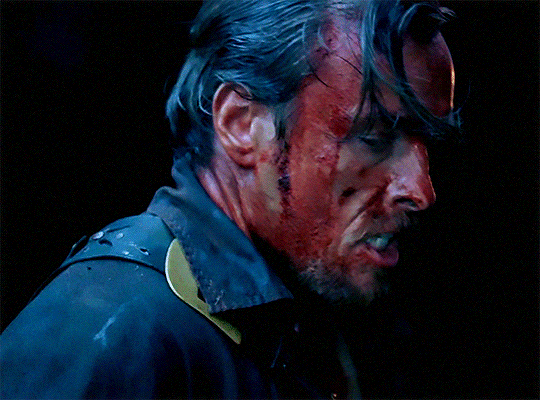
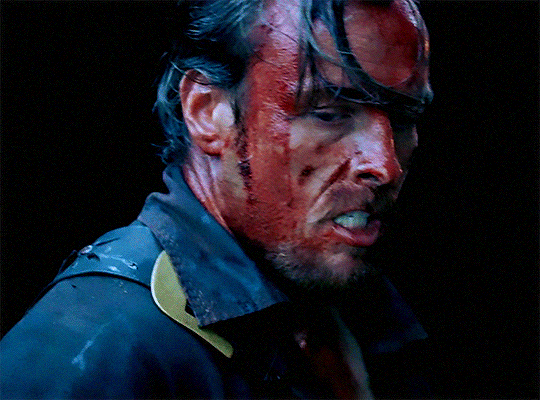

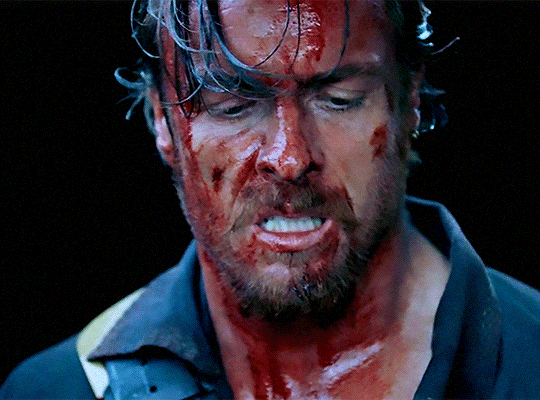
JAMES FLINT ▸ Black Sails, 1.5
#me? completely losing my morals every time I see a man covered in blood? p r e p o s t e r o u s#tv#black sails#flint#toby stephens#captain flint#captain james flint#james flint#gif by ria#tw blood
155 notes
·
View notes
Photo
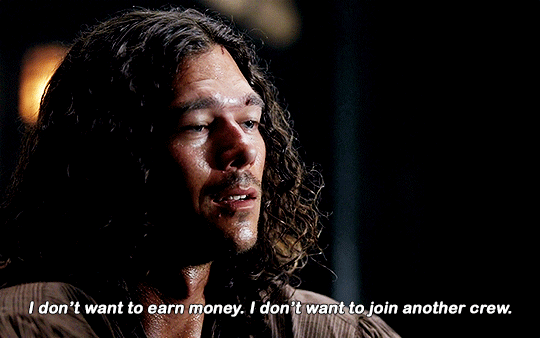


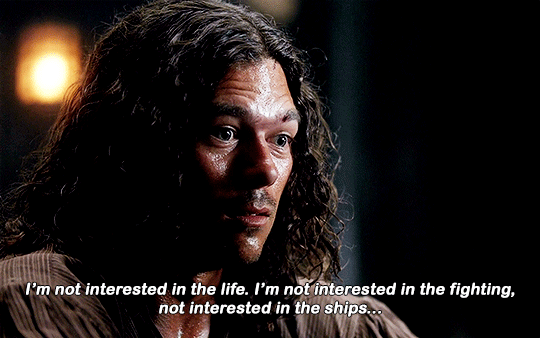




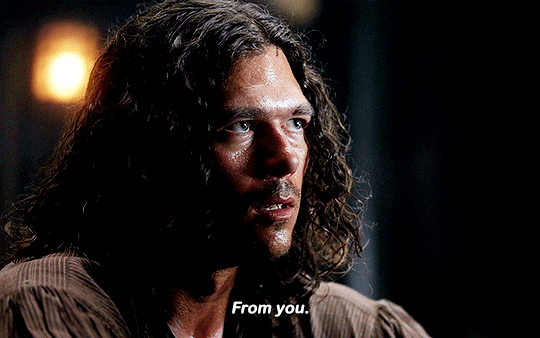
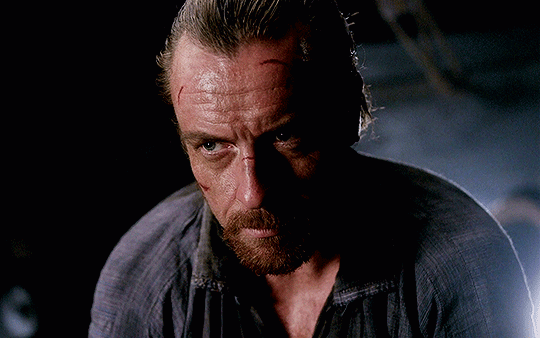
You could walk away from all this, if you wanted. The moment we arrive at Nassau, you’re free to go anywhere you want... and yet, you’ve offered to help me regain control of this crew. Why would you do that?
BLACK SAILS — X.
#black sails#john silver#james flint#blacksailsedit#bsedit#blacksailssource#perioddramaedit#periodedit#tvedit#televisiongifs#tvarchive#filmtvcentral#john silver u are my special little man...#also i don't know how much this will do for me but kjnfskj i am on my first watch pls don't drop spoilers in the tags of rbs#i would appreciate it 🥺#haven't gotten anything major thus far which is cool and i Get it's an old show but i am trying my best to go in blind#.gif#q
912 notes
·
View notes
Text
The reaction to Stoker transcribing accents/dialects is just so fascinating to me because it's really not that uncommon in older English language pop fiction. Here's a bit of The Pickwick Papers, by Charles Dickens.
‘Wery glad to hear it,’ said Mr. Weller. ‘Poetry’s unnat’ral; no man ever talked poetry ‘cept a beadle on boxin’-day, or Warren’s blackin’, or Rowland’s oil, or some of them low fellows; never you let yourself down to talk poetry, my boy. Begin agin, Sammy.’
If you're wondering what the hell kind of English accent does that v/w shift, the answer is 1830s Cockney, although apparently Dickens did miss the mark himself just a bit. George Bernard Shaw had this to say about it:
“When I came to London in 1876, the Sam Weller dialect had passed away so completely that I should have given it up as a literary fiction if I had not discovered it surviving in a Middlesex village, and heard of it from an Essex one.”
Shaw also cited James Elphinstone's translation of Martial into the phonetic Cockney of the late 1780s:
Ve have at length resoom’d our place,
And can, vith doo distinction, set;
Nor ve, the great and wulgar met.
Ve dooly can behould the play,
Sence ve in no confusion lay.
Note here Elphinstone's convention of rendering 'u' with a double 'o', which Stoker also uses. Going back to Shaw, one of the more amusing notes in the play Pygmalion is attached to Eliza Doolittle's opening line:
THE FLOWER GIRL. Ow, eez ye-ooa san, is e? Wal, fewd dan y’ de-ooty bawmz a mather should, eed now bettern to spawl a pore gel’s flahrzn than ran awy atbaht pyin. Will ye-oo py me f’them? [Here, with apologies, this desperate attempt to represent her dialect without a phonetic alphabet must be abandoned as unintelligible outside London.]
I concede that Stoker leans harder into this attempt at capturing Cockney than he needs to; yes, Thomas Bilder's accent comes across a bit cartoony. Dickens didn't lean quite as hard, and Shaw just gave up after giving an example. It just wasn't particularly beyond the pale. I mean, look at this bit of 17th century West Country dialect from Lorna Doone, published about ten years before Dracula:
“I wor over to Exeford in the morning,” John began from the chimney-corner, looking straight at Annie; “for to zee a little calve, Jan, as us cuddn't get thee to lave houze about. Meesus have got a quare vancy vor un, from wutt her have heer'd of the brade. Now zit quite, wull 'e Miss Luzzie, or a 'wunt goo on no vurder. Vaine little tayl I'll tull' ee, if so be thee zits quite. Wull, as I coom down the hill, I zeed a saight of volks astapping of the ro-udwai. Arl on 'em wi' girt goons, or two men out of dree wi' 'em. Rackon there wor dree score on 'em, tak smarl and beg togather laike; latt aloun the women and chillers; zum on em wi' matches blowing, tothers wi' flint-lacks. 'Wutt be up now?' I says to Bill Blacksmith, as had knowledge of me: 'be the King acoomin? If her be, do 'ee want to shutt 'un?'
Note that R. D. Blackmore was dead serious about capturing this dialect. He did intensive, painstaking research. The point was not to mock these characters, it was to try to capture, through language choices, a spirit and mood particular to a time and place. It matters who has this dialect and who doesn't in the narrative.
While Stoker didn't have such lofty ambitions, don't think the point is to mock either. I think it's Stoker trying to do the old 'capturing local colour' thing. He wasn't alone in that. Off the top of my head, Sholem Aleichem transcribed a Jewish German's accent phonetically in some story whose title escapes me in order to differentiate him from the Eastern European Jewish characters with whom he identified.
I've seen people hammer Brian Jacques (a much more modern writer) for the same thing Stoker's doing, and I guess it's just been normalized for me. Do know if you go on reading fiction from the place and period-- especially pop fiction not intended as high art, like Dracula-- you will encounter more of this kind of thing. It was a convention. Conventions come and go.
#dracula daily#comparative literature#dracula daily meta#long post#incidentally 'atbaht' seems to be a misrendering of 'athaht'#but i'm going with what's written on the project gutenberg version
85 notes
·
View notes
Text
Black Sails is tangentially responsible for my picking up the corpse of Going to Weather that I left waterlogged in 2018. Picking the title up and wringing it out and re-writing absolutely everything about it in 2021 to create something that I love and I’m quite proud of as a narrative. Because I was doing a Black Sails rewatch and was just like ‘ugh MAN do I miss having a boat story to work on…..I want a boat story to work on….I need to draw some Tormented Captains.’
Thank u James Flint…
35 notes
·
View notes
Note
why did you ruin that post about interesting ships with that picture of a random ugly man :(. its really frustrating when people trick people into reblogging something then change the ost when it gets popular. it also fucks up how the post looks in the archive. i hate it so much :(.
that random ugly man is gay icon captain james flint put some respect on his name u bitch
#also how did i trick u bitches that post was untagged#it was never meant to get past five notes#if u want the serious answer it’s bc ppl were being really annoying on that post
6 notes
·
View notes
Text
i’ll say it i think when flint first got to nassau he and vane fucked and for flint it was very emotional and meaningful because it was the first time he has sex with another man since thomas and for charles it was just guys being dudes. cuz like. sometimes ur at sea for months with no women so u gotta have sex with the homies ya know? and also owning cups is gay.
and i think this drove a wedge between them that escalated to the absolute “hating each others guts and getting into constant screaming fistfights” energy we see in the pilot, because of course charles “fucks men but doesn’t consider himself gay” vane would drive james “queer liberation” flint up a fucking wall.
0 notes
Photo


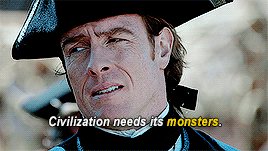

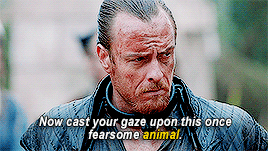
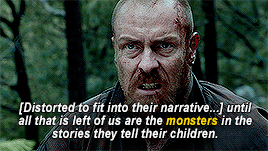



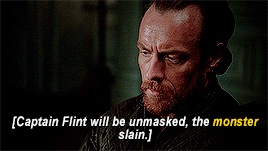
James Flint + Being a Monster.
#james flint#blacksailsedit#black sails#bsedit#gifsi#below 100#obv. not everything is 'monster' but man u might as well replace it with it#like i love/hate that is his narrative that he so desperately tries to escape throughout the show but it constantly follows him#1x01#1x07#2x01#2x04#2x09#2x10#3x01#3x05#4x10
417 notes
·
View notes
Text
God I A D O R E Thomas Hamilton.
What a legend.
Quoting the Bible to a man he's in love with?
Looking past all the ugliness of the world and still managing to stay positive even in the darkest hour?
Making his wife promise that she and the man they both love will be safe together as he himself is dragged away to a psychiatric ward?
Calling his father out on his double standards and basically telling him that he'll be going to hell for his shit?
Giving James space and letting him come to him instead of actually pushing him and “pulling his rank“
Touching first his shoulder and then his cheek oh so softly
Literally giving no shit about what people will say about his wife fucking another man because why would he? It works for the three of them and that's the only concern is it not?
The absolute J O Y on his face when he recognizes James standing in front of him at the plantation and his laugh when he hugs him close.
I A D O R E T H O M A S H A M I L T O N.
#my heart belongs to thus golden retriever puppy#and i will never be the same person#thomas hamilton#hinestly if there was one fair thing that hapoened to miranda hamilton during the course of this show#was the marriage#because she could never have married a better man#and no i dont care if he satisfied her in the bed#this here is above all that#and besides james joined them didnt he#so this is redundant#black sails#james flint#miranda hamilton#flinthamiltons#rupert penry jones#rpj#thanks#roo#you hot mess#u acted beautifully#tipsy shitposting
112 notes
·
View notes
Text
AU where Vane lives and he and his dad get Madi and together they free James and Thomas from the hell-plantation and then they get on their ships and fight the fucking system until England and Spain both cower in fear of the fucking pirate-slave-army that has come to their shores to fuck shit up.
#can u tell i'm in the need of fix its?#black sails#charles vane#edward teach#bsmadi#james flint#thomas hamilton#flinthamilton#also#give vane a boyfriend the man has been fucked over by women too many times
50 notes
·
View notes
Text



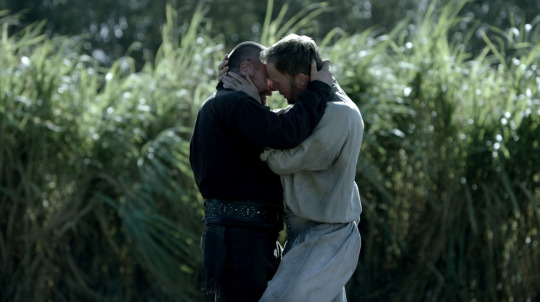
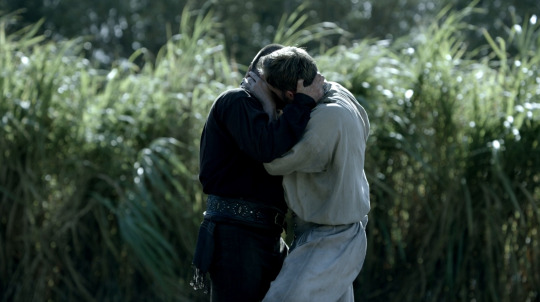
god i love canon
#flinthamilton#like. can u believe this is canon#this man spends ten years grieving his lover#never looks twice at anyone else#never even considers moving on#and then. at the end of everything#he gets to be happy#the love of his life - his truest love - is alive#and still loves him#ITS PERFECT#but it really has ruined me for most other ships tbh#like oh they looked at each other?#yeah james flint remained faithful to his presumed dead lover for ten years and then finally got him back#honestly nothing compares
98 notes
·
View notes
Text
Capitalism & Racism in Black Sails
In order to properly understand the individual and collective responses to England’s empire in Black Sails, it is necessary to understand capitalism and its relationship to racism. What follows are my thoughts on the relationship between capitalism and racism (focusing on the late 1600s/the development of capitalist England), and how those things relate to the show. It’s a long post, but by no means is it an exhaustive analysis of either capitalism or Black Sails, so I look forward to what others have to say on the subject!
First, what is meant by “capitalism”?
Capitalism describes an economic system in which private businesses own the means of production––the materials and tools used in the production of goods. This system creates distinct classes within society: the bourgeoisie who own the corporations and the proletariat who must work at these corporations and thereby become subservient to the bourgeoisie.
Explained in Ellen Meiksins Wood’s The Origin of Capitalism, capitalism emerged most specifically in England as a result of the agrarian feudal creation of the landlord-tenant relationship, in which the landlord rented land to the tennant, who was incentivized to produce as many goods as possible. This system led to the complete privatization of land and the creation of wage-laborers who could not produce enough goods to themselves become part of the bourgeoisie. Over time, as these wage-laborers became more numerous, society shifted from being agrarian-centered to revolving around the creation of cities to facilitate the mass production of goods.
How is capitalism tied to racism?
The spread of early capitalism throughout Europe was facilitated by improvements in technology allowing for the mass production of goods from raw materials. Capitalist countries thus turned outward in search of raw goods to power their economies. As Marx explains in Capital:
The discovery of gold and silver in America, the extirpation, enslavement and entombment in mines of the indigenous population of that continent, the beginnings of the conquest and plunder of India, and the conversion of Africa into a preserve for the commercial hunting of blackskins, are all things which characterise the dawn of the era of capitalist production. These idyllic proceedings are the chief momenta of primitive accumulation. On their heels treads the commercial war of the European nations, with the globe for a theatre (Chapter 31).
Capitalism thus rests on the idea of “primitive accumulation,” that being the initial expropriation of the individual from the land, achieved through feudalism domestically and chattel slavery internationally. Because capitalism demands the constant mass production of goods, it requires increasing volumes of raw goods––sugarcane, cotton, coffee beans, etc.––which are obtained through the extension of colonialist enterprises in order to keep parts of the world in a continuous state of underdevelopment.
Although pre-capitalist societies had slaves, the advent of capitalism necessitated slavery on a mass scale, produced through the Trans-Atlantic slave trade, in which indigenous populations were wiped out and replaced with slave laborers. This system resulted in complete alienation of labor as white laborers in the “New World” were replaced by the early 1700s with more ‘cost-effective’ enslaved Africans who had no ties to their owners or to the land they worked. As former Trinidadian Prime Minister Eric Williams put it:
Here, then, is the origin of Negro slavery. The reason was economic, not racial; it had to do not with the color of the laborer, but the cheapness of the labor. [The planter] would have gone to the moon, if necessary, for labor. Africa was nearer than the moon, nearer too than the more populous countries of India and China. But their turn would soon come” (14).
Racism, then, is indistinguishable from the power structures of capitalism. The desire of the bourgeoisie to increase their capital led to the creation of the slave trade in order to accumulate mass volumes of raw goods so their proletariat workers could transform them into goods to then be sold back to the workers for profit.
This system thus creates two types of exploitation: the exploitation of the enslaved people and colonized lands, as well as the exploitation of the domestic working class. The need to keep this system in place demanded capitalist societies craft the false belief in white supremacy in order to justify the enslavement of Africans, Indians, and various Indigenous peoples in Asia and Latin America.
So, how does piracy come into the picture?
In the mid-late 1600s, England began its industrial revolution, propelling the island to increase its Atlantic trade. This desire to trade created a new merchant class, expanded the number of laborers in American colonies, and launched England into various wars with competing European powers. In Villains of All Nations: Atlantic Pirates in the Golden Age, Marcus Rediker describes the social conditions of this era thusly:
By 1716, big planters drove armies of servants and slaves as they expanded their power from their own lands to colonial and finally national legislatures. Atlantic empires mobilized labor power on a new and unprecedented scale, largely through the strategic use of violence––the violence of land seizure, of expropriating agrarian workers, of the Middle Passage, of exploitation through labor discipline, and of punishment (often in the form of death) against those who dared resist the colonial order of things. By all accounts, by 1713, the Atlantic economy had reached a new stage of maturity, stability, and profitability. The growing riches of the few depended on the growing misery of the many.
Piracy emerged from this poverty in England and in its colonies, as poor people who knew how to sail figured they had little to lose and much to gain in turning to piracy. Moreover, piracy offered an alternative to the oppressive nature of living under England’s empire. Pirate ships “limited the authority of the captain, resisted many of the practices of capitalist merchant shipping industry, and maintained a multicultural, multiracial, and multinational social order.” On these ships, pirates learned “the importance of equality…[their] core values were collectivism, anti-authoritarianism, and egalitarianism, all of which were summarized in the sentence frequently uttered by rebellious sailors: “they were one & all resolved to stand by one another.” In Marxist terms, pirates retained control over the means of production and their labor, producing a more egalitarian division of profit in which all received the same share.
The Golden Age of Piracy, then, emerged in response to England’s adoption of capitalism. Despite the threat of death, exploited workers turned to piracy out of desperation and the quest for securing immediate wealth. Although piracy was often violent, it nonetheless embodied a system of labor in stark contrast to that of capitalism, based not on unequal acquisition of goods but on the fundamental equality of human beings.
How does this capitalist context enrich our understanding of Black Sails?
England’s capitalist-driven empire provides the system under which all of our characters struggle and thus informs their every decision. The characters’ backstories we are given all pertain to their desire to either escape from capitalism or assimilate with it. As this post is quite lengthy, I won’t go into detail about every single character, only the ones who most illustrate the manner in which capitalism operates.
First, James Flint’s backstory is not simply that of a man who experienced homophobia and wants revenge for it. We learn of him that his father was a carpenter and he was raised by his grandfather in Padstow, a working-class fishing town in north Cornwall. Because of this, he was barred from receiving a formal education and likely joined the navy because it offered him the opportunity for some sort of upward mobility, though it’s clear in his interactions with his peers that they will never see him as an equal due to his lower-class status. The manner in which James’s peers treat him very likely plays a role in his decision to support Thomas’s plan for Nassau. Despite the plan still being colonialist, it did seek to undermine a key component of capitalism: the dehumanization of the working force. This dehumanization is a fundamental element of capitalism (and this empire) because if laborers believe they have inherent worth, they are more likely to challenge the bourgeoisie. Thus, James’s exile from England was not because he was gay, but because he sought to undercut the foundations of England’s wealth, a choice driven by his love for Thomas and his own relationship to capitalism.
Connected to Flint’s backstory is Billy’s, as it also involves the navy. From the mid-1600s to the early 1800s, Britain relied on the practice of impressment––forcing people to serve in the navy––to advance its colonial aims. Billy’s parents were levellers, people who opposed impressment. As punishment for this, Billy was taken as a child and forced into “press gangs” and served in the Navy for three years as a bonded laborer (the naval equivalent of debtors’ prison) until his ship was captured by Flint and he was given the opportunity to join the crew after killing his captor. Like Flint, then, Billy became a pirate as a direct result of the violence done to him by capitalist-imperialist England.
Likewise, Jack became a pirate as a consequence of English capitalist industrialization. His family had for generations owned a tailoring business, but it was driven out of business by the creation of a massive textile mill. After his father died, Jack was forced to assume responsibility for his father’s debts, which he would work off as an indentured servant at the very textile mill responsible for the debt. Jack, then, turns to piracy to escape capitalism.
To understand the backstories of Flint, Billy, and Jack, you must understand the process by which England assumed a capitalist economy and how that shift from feudalism to capitalism affected both domestic and international practices in the early 1700s. The introduction of distinct classes based on relationships to labor mandated strict inequality and the valuation of mass production at the expense of individual lives.
How does Black Sails depict the relationship between racism and capitalism?
The most obvious answer here is the show’s involvement of Madi and the Maroons, who exist solely as a result of the trans-Atlantic slave trade. Because this is already a lengthy post, I would like to set Madi aside in order to talk about Max, who I think offers a less overt critique of what Cedric Robinson calls “racial capitalism.”
Max, rather than seeking to run from capitalism, wants to become a member of the bourgeoisie. Her enslavement is, of course, the result of French colonialism in the Caribbean, but rather than recoil from civilization, her enslavement propels her to want to join it. As she tells Anne:
“When I was very small, I would sneak out of the slave quarters at night to the main house. I would stand outside the window to the parlor. I would stand amongst the heat and the bugs and the filth on my toes to see inside. Inside that house was a little girl my age… With the most beautiful skin. I watched her dance while her father played music and her mother sewed. I watched her read and eat and sing and sleep, kept safe and warm and clean by her father. My father. The things it took to make that room possible, they were awful things. But inside that room was peace. That is what home is to me” (3.3).
She reiterates this understanding of society to Marion Guthrie when she states that “progress cannot begin and suffering will not end until someone has the courage to go out into the woods and drown the damned cat” (4.07). While she recognizes the evils of civilization, she also believes that it offers comforts for the select few, and she wants to be one among the few.
Max, indeed, is successful in assimilating into capitalist society. She works her way out of sex work until she owns most of Nassau, not once but twice. This achievement initially seems like a massive success and proof in the viability of Max’s methods, but in subtle ways, the show demonstrates that assimilation is not liberation.
Because, as Ibram X. Kendi stated, “The life of racism cannot be separated from the life of capitalism,” Max’s attempts to assimilate come with the betrayal of the rest of the enslaved people. Although she herself refuses to use slave labor, her treaty with Mrs. Guthrie, Silver, and the Maroons requires the Maroons to return escaped Black people into slavery. Moreover, she has won herself power in a system that refuses to recognize her presence, forcing her to pretend that Featherstone is the real governor of Nassau.
Further, her assimilation into the capitalist system alienates her from other Black people. The two characters with whom she is most closely associated with are Anne and Eleanor, white women whose whiteness affords them a certain level of protection not offered to Max. She never interacts with Madi or any of Madi’s people and she therefore cannot comprehend any other path but assimilation.
For all of Max’s efforts to learn from Eleanor and do better than Eleanor in running Nassau, she ends up in virtually the same place as Eleanor, but even more hidden. The Guthrie family still holds financial control of Nassau, Woodes Rogers still looms in the distance, and though piracy exists, it is even less acceptable. Thus, while Max is often credited as the person who most “sees life as it is,” her alienation under capitalism prevents her from seeing life “as it should be.”
Conclusion
As capitalism emerged as the dominant economic and political system beginning in the early 1700s, it came to define all aspects of global society, down to the very relationships people had with each other. It is impossible, then, to truly understand the motivations of anyone in the show without discussing their relationship to capitalism. This is by no means an exhaustive account of Black Sails’ commentary on capitalism and racism (I didn’t even mention Vane’s conversation with the Spanish soldier), but it hopefully underscores the idea that knowledge of capitalism (and therefore imperialism) is essential for fully comprehending the show.
36 notes
·
View notes
Text
i think what some people tend to not realize is that silver’s repression is like a HUGE part of his dynamic w flint. silver is so completely unwilling to do any kind of self reflection which we see based on the whole like “my past is irrelevant” you know its a really fascinating thing to build a character on but it’s also deeply deeply unhealthy like silver utterly refuses to reflect on a past that he says explicitly was full of “unending horrors” like the actual nature of that trauma aside it’s a really important part of silver’s character that he refuses to reckon with it! he refuses to deal with the fact that even though his past was awful it’s still part of him and instead chooses to ignore his past and remake himself whenever he wants to.
that’s what makes it easy for him to reject his bisexuality over and over because 1. it’s much easier to be a chameleon when theres nothing remarkable or targetable about u he wants to be a perfectly average white guy who’s a little dumb (which by the way is why he acts like an idiot in the first 2 seasons its a false persona it’s not a character trait) and being bisexual doesnt fit w that bc it would put a big fat target on his back. and 2. he literally cant stand the idea of genuine human connection “you know all of me i can bear to be known” and to draw out something so deep seated and repressed as his attraction to men it would require a meaningful and honest relationship w another human being and specifically another gay man bc he refuses to do this self reflection on his own so at the very least it would take seeing that aspect of himself reflected in Another person who he had a meaningful connection to. and that was flint.
and so flint makes silver deal with something that he has very successfully repressed his whole life! that’s why and how silver consistently sees flint the way he does! like he thinks of flint as incredibly powerful and capable almost inhumanly so and he is shown to be unnerved by the fact that flint can talk him into anything (when they were on the ship after the storm when he’s saying “he had the men right where he needed them but he had me there too,” at the end of s4 when those thoughts are narrated by hands the fact that silver will usually believe what flint tells him). and he sees those things as proof that Flint is a monster (his final speech to madi “i’m not the villain here i’m not him”) instead of those things just...being true of somebody you really love and respect! the reason he thinks so highly of flint and the reason flint can convince him of anything is bc silver just really likes flint!
but that’s too hard for him to deal with. truly reckoning w the “darkness” that is part of flint and is part of their relationship is just too painful for him to do and so instead he decides to condemn darkness as violent and evil and monstrous. he decides to condemn FLINT as violent and evil and monstrous (his final kindness being, in his words, killing flint and reviving mcgraw even though james is both of these people at once). and in doing so, he condemns that part of himself that he can’t deal with and locks it away. like it’s said at least once or twice that silver and flint are becoming so tied up w each other in billy’s words “i couldn’t tell where one ended and the other began and i feared separating them would destroy them both.” so silver “killing” flint is in effect him trying to destroy a part of himself that he doesn’t want to know
#mine#black sails#analysis#silver+flint#the original point of this was that they would not have casual sex or confess any romantic feelings for each other in the canon timeframe#and it would take silver a very ridiculous and explosive coming out to himself moment before he was able to deal w his feelings abt flint#and also i dont think flint would want to hold his hand thru that coming out to himself moment#bc flint has issues w shame and guilt and how he's seen by others#but he's never been a very repressed person#things come to the surface and he registers them as they do#so like. he doesn't know what to do w silver being THAT deep in the closet
295 notes
·
View notes
Note
Damn I loved jealous rafe that was so hot... could we maybe get a really really REALLY jealous Sophie?? Obviously only if ur down for that, I adore your writing but want u to take care of urself drink ur water & be happy most importantly :)
hi I really appreciated the last half of this message thank you :) I’m not quite sure this is really really REALLY jealous but it’s still a lot of jealous!
__
Colin’s sister, April, was hopelessly in love with Rafe. And Rafe had no clue.
She was a freshman and a film major, so Colin introduced the two so Rafe could give her advice on classes. She texted him at least once a week, usually more. After Colin brought her to their tailgate in November and Rafe was nice enough to make her a few (watered-down) drinks, then drop her off at her dorm, she was convinced Rafe felt the same way toward her.
The texts became constant enough for Sophie to notice, always seeing April’s name popping up on Rafe’s phone. April had taken the liberty of saving her phone contact for Rafe, as April 💛. Sophie didn’t want to be the jealous, imposing girlfriend straight away, so she did her best to ignore it.
As Rafe and Sophie were hanging out on the couches at Delt, she saw three texts pop up on his phone in a quick succession, and he swiped them away just as fast as they had came in.
Sophie leaned over, curious. “What’s my name saved as? In your phone?”
“Uh.” He took a moment to think, then scrolled through his contacts and showed her. “Just this.” She tried not to visibly react when she saw it, just saved as Sophie Flint. “That’s it?”
“Well, yeah, I just kept it from when you saved it at the bar for me, remember? Does it matter?”
“No, uh, it doesn’t. Never mind.” She forced a smile and settled into his side and he returned to absent-mindedly playing with her hair.
“Why, what’s mine saved as?” He asked, reaching for her phone. She held it out of his reach. “Just Rafe.”
He grinned. “Not love of my life, Rafe Cameron?” She scowled and grabbed his hand, moving it back to her hair. “Definitely not.”
_
The next time April was brought up, Sophie was watching a movie with Rafe in his room, both of them sprawled out on the couch.
“Hey, dude. Me and April are gonna go grab dinner, you wanna come?” Colin asked, grabbing his wallet from the dresser. He gave Sophie a friendly smile. “Oh yeah, you can come too if you want, Sophie.”
“Nah, we have plans to go meet up with Soph’s roommates. Tell her hi though.” Rafe declined. Sophie stayed uncharacteristically quiet, tucking into Rafe’s side. “Will do. She’ll miss seeing you.” Colin waved and headed out.
Rafe glanced down at Sophie, rubbing her arm. “You good, Soph?”
“Sure you don’t want to go hang out with her?”
He looked confused. “No. Thought we made plans to grab pizza with Allie and Julia, was I wrong?” She scowled, just slightly. “No, we have plans. Never mind.”
“Okay...” He didn’t press the issue further, just turning up the TV volume a little more. After a while, she turned in her seat, sitting further away from him. “This movie’s kind of terrible, isn’t it?” He frowned. “But it’s Anna Karenina, I thought you liked Keira Knightley.”
“She cheats on her husband.” Sophie shifted again, putting even more distance between them. Rafe reached out and tugged at her ankle, trying to bring her closer. “Hey. You said you liked this movie.” She shook her head. “Never said that. Maybe you’re thinking of someone else.”
“Fine, maybe.” He slid his hand up her leg, but she flinched away, drawing her knees up to her chest. “Soph, what’s the deal?” He pulled his hand back.
“Nothing, what’s your deal?”
“My deal? I don’t have a deal. You’re acting weird.”
She crossed her arms. “I’m not.”
“Sophie.” He frowned more. “Baby, come on.”
“Don’t call me that. You know, I’m gonna just go to dinner with the girls alone. You can go with April.” It was a test, and he didn’t know it. She paused before getting up, glancing over his body language.
He shrugged. “Okay, been meaning to catch up with her anyways.”
Sophie huffed. “Fine.” She grabbed her phone and stood, not giving him a second glance as she left.
_
The next time, Sophie was lying with Rafe on his bed, James in his. This was a fairly common occurrence, with Sophie comfortable hanging around his friends.
“Bro, did you see what April was wearing last week?” James asked, tossing a tennis ball from his bed toward Rafe. He caught it one-handed, sitting up a little to toss it back to James. “No, was she at our party?”
“Yeah. Can’t believe she wore that dress, some guy was hanging all over her.” He frowned, shutting up the second Colin came in. Sophie raised her eyebrows. “What’s so wrong with the dress?”
Colin cocked his head. “What dress?”
“None of your business.” James snapped back, shooting Sophie a dirty look. She frowned, confused and a little hurt. “Don’t be rude.”
“Hey, knock it off, you two.” Rafe admonished, loosely curling his arm around her shoulders. She shrugged him off, annoyed, and swung her legs off the bed. “I’m gonna go, need to study.”
Rafe frowned and took her hand. “Thought we were going to study together?”
“Yeah, well, you thought wrong.” She replied, a little more snippy than she needed to be. “Soph, come on.” She ignored him as she gathered her things and left and James whistled, shaking his head. “What’s all that about?”
Rafe threw the tennis ball hard at him, nailing his leg. “You were being an asshole.” James yelped, tossing it hard back at him but Rafe ducked away. “She was - you know!” He argued, gesturing at Colin. “Still not cool, man! Text her and apologize.” Rafe shot back.
“What the hell am I missing?” Colin glanced between the two of them, thoroughly confused. “Shouldn’t you go after her?”
“Nah, she doesn’t like being followed after a fight.”
“Have you two fought since getting together? Like you used to?” James asked.
“Well...no.” Rafe paused. “But this isn’t about us, this is your fault.” He glanced at Colin for backup. “Right?”
“I still have no fucking clue what you’re on about.” Colin replied.
“Doesn’t matter.” James dismissed it, sending Rafe a glare and effectively ending the conversation.
_
Sophie tried distancing herself from Rafe, somewhat, as jealousy built up inside of her. She had him come over before they had plans to go out while she got ready. His attention went back and forth between her and his phone the whole time and Sophie was already regretting inviting him over as she saw April’s name popping up on his screen.
“Rafe, which one?” She turned to him in just her bra and jeans, holding up two tops. One blue, one yellow.
He didn’t glance up from his phone. “Uh...the black. You always wear that one.”
Her cheeks flushed with embarrassment and anger as she ditched both, opting for a sweatshirt instead and flopped onto her bed. He swiveled around in her desk chair, confused as he eyed over her messy bun and flat iron still plugged in on the counter. “You’re wearing that to go out?”
“Why, is this not good enough for you?”
“No, it’s fine. I just thought...” At her glare, he raised his hands in defense. “Never mind. You ready to go then? Colin is seeing one of the bartenders and said she could snag us free drinks if we showed early.”
Sophie sat up quickly, looking like she was about to cry. “You don’t want to go hang out with the girl blowing up your phone?”
“Huh? Soph, what are you talking about?”
“April?” She bit her lip, avoiding his gaze.
He laughed, loud. “April? You’re serious?”
“Oh, good, laugh at me, that feels great. I feel like you’re cheating on me and you’re fucking laughing.”
It took him a few moments to process before he crossed the room in two big strides and grabbed both her hands, squeezing them. “I’m not cheating on you, Sophie, I would never.” When she glanced up, he continued. “April is Colin’s freshman little sister, she texts me for film school advice. That’s it.”
“...Oh.” She breathed out, wanting to shrink back into herself and disappear. “So when James was talking about what she was wearing...”
“She’s practically like our little sister now too, James is just protective.” Rafe clarified, reaching up and swiping his thumbs over her cheeks to get rid of a couple stray tears. “Don’t cry, Soph, it’s okay.”
“Fuck, Rafe, I’m so sorry.” She laughed softly, a little shaky. “She was just texting you all the time - and the heart next to her name in your phone, I just -”
“Ah, shit. Yeah, I see what you mean.” He pressed a kiss to her forehead, then over both her cheeks, then the tip of her nose, making her giggle. “I’ll change it, promise. Look, I’ll introduce you two tonight, you’ll see.” He tugged at the hem of her sweatshirt. “Still want to wear this?”
She shook her head and reached up, giving him a short kiss. “No, I’ll go change. I’m sorry. Again. I should have just asked.” She paused. “In my defense, it didn’t help seeing a text saying ‘thanks for last night’ with the kissy face emoji. Especially when I knew you were out with the guys the night before.”
“I dropped her off after she got trashed at one of our tailgates.” Rafe replied, shaking his head. “But you know what, I see where you’re coming from.”
Once they made to the bar, Sophie followed him in and over to his group of friends all crowded in a corner. April, who looked extraordinarily similar to Colin, grinned when she saw Rafe and threw his arms around him, leaning up to kiss his cheek. “Rafey, hi!”
He turned red, leaning away from her kiss but gave her a short hug back. Sophie raised her eyebrows at him and held back a smile and an I told you so, but he could tell anyways. He wrapped his arm around Sophie’s waist. “Hey, April, this is my girlfriend, Sophie.”
“Girlfriend?” April repeated with a hint of disdain. “Rafe, you didn’t tell me you had a girlfriend.”
James snorted into his drink watching the exchange.
“It’s only been official for a little bit.” Sophie clarified, placing her hand possessively on Rafe’s chest.
“Oh, so it’s nothing serious.” April brightened. “Rafe and I have known each other for months now, we’re pretty close.” She told Sophie, leaning over the table to give Rafe an eyeful of her chest. Colin tugged her up by the back of her shirt right away and Rafe dug his fingers into Sophie’s side a little, painfully aware of the situation now.
“I’ve known him since high school, but thanks.” Sophie shot back a sweet smile. “You might have more luck hitting on someone your own age, by the way.”
April turned bright red and took a long sip from her drink. “I’m not - I wasn’t -” She stammered.
“It’s fine. I can see where you’re coming from.” Sophie raised her eyebrows and gave Rafe a kiss on the cheek. “I’m going to get another one, anyone else?” At no response, she turned on her heel and left.
“You’ve been hitting on Rafe?” Colin questioned April, disgusted. She just scowled and left the group to go find her friends, thoroughly embarrassed. James elbowed Rafe with a grin. “She’s possessive, huh?”
“Yeah, shut up.” He grinned back, ears turning red.
121 notes
·
View notes
Note
I was thinking about when Miranda said how great men are made great by the relentless pursuit of a better world and the ending of black sails, how James actually stops the war to be with Thomas (it depends on how you see the after canon but still) and I wanted to know your thoughts about this (if u have any). Sorry for the bad english
Oof okay...so. Uh. This is actually something I feel really strongly about! Please don’t take any of this as like, a negative/takedown thing, but I disagree with the basic premise you’re working from. Nothing personal! Just, that’s not how I see the finale.
So the basic premise of “Flint chose-” in regards to the finale is not true to me.
Flint didn’t ‘choose’ anything. His ‘choices’ were death, or giving in. At the point which Silver leads him into the forest, the war is already over.
Without Silver, and especially with his active opposition, the war has no chance. We see that Silver is able to convince the maroons and the pirates(presumably over Madi’s objections) that the war is not worth fighting. We also know that Silver holds a lot more sway with the men at this point than Flint. And, Silver has a gun pointed at him and very clearly says “If you don’t accept this outcome I’m going to shoot you. I will stand here for however long it takes you, but your options are giving in to this, or a bullet between the eyes.”
Because Silver knows that what Miranda said is absolutely true. Flint is not ever going to give up the fight. He has internalized this relentless pursuit of a better world as a way to memorialize Thomas, yes, but he also truly believes in it. It’s why I assume Silver didn’t just have Thomas brought to Nassau. If he truly thought that all it would take to calm Flint’s ire was to have his love back, why not just set Thomas up somewhere with a house and a cow and give Flint a map and say ‘go find your husband’ ?
It’s because he knew that wouldn’t work. He knew that Flint, for all that he would dither about it, would not choose Thomas over the war; just as he expected Silver to choose the war over Madi. This becomes doubly true if it wasn’t an active choice of ‘the war or Thomas’ death.’
People give a lot of credence to when Flint says ‘I don’t know that I wouldn’t have done what you did’ as a support for him actively giving up the war, but that’s not comparable to his choice in the finale, because Thomas is not in active danger from him continuing the war. Madi’s survival depended on the surrender of the chest in Silver’s mind - and Flint still expected him to choose the war.
And remember he already knows Thomas is alive.
If at that point, again, Silver truly thought that Thomas would be enough to stop Flint, why not tell Flint Thomas was alive, watch him leave, and then surrender the chest to secure Madi’s freedom?
Because he knows that’s not a choice Flint would make:
I think if he knew how close we were to winning this war he gave his life for, he wouldn’t want me to.
(And oh, what a nice parallel we have there for Madi and Thomas!)
What Flint might do, though, is choose Thomas over death.
Silver doesn’t want to kill Flint. We can argue from dusk until dawn over the reasons, but that much is undeniably true. Some would say it’s because he loves him, I argue it’s because he doesn’t, as Max says when she tells him about the plantation “want to live with it.”
Silver has always insisted that guilt goes away, that one’s past has no prescience, but he knows that is not true, and he also knows that if he kills Flint, Madi will absolutely never speak to him again. (I hope she never does anyway but it’s a surety if he kills her partner.)
So anyway, Flint knows this when Silver points the gun at him.
“So, what decisions have you made, about what our tomorrows will be?”
He knows he’s been outmatched. He knows that Silver has outgunned him. He knows that the war he and Madi have given so much for is dead because of Silver’s lack of faith and ability to see something through to the end. There is no fight, after this.
And it is into this context that Silver has given him the choice - one in which Silver expects him to choose death unless he presents James with an alternative.
Silver knows about Thomas. He knows about Miranda, about how suicidal Flint has been the entire time Silver has known him. He knows that death does not scare Flint. You point a gun at the man and he just shrug emojis like ‘well if there’s nothing I can do you might as well, both the people I love are dead.’
And that’s why he tells Flint about Thomas. Thomas is his ace in being able to convince Flint he maybe doesn’t want to die. To convince him there is a second option.
But again, the war is already over. Flint was not given the choice of
Continue the war
Get Thomas back
The choice was
Go to the plantation and be imprisoned there with Thomas
Die
(This is also why I have a huge problem with Silver’s story to Madi, because he is seeing this as a choice - just as he sees his staying on the island as a choice for Madi. He ignores the fact that a) ‘reorienting’ to the daylight is literally him forcing Flint to reassimilate into British society and b) there IS no returning to who Flint was before ‘the nightmare started’. For him, he might think that’s possible. Hell! HE might even wish it. I think he truly does. But for Flint? Who defines himself by his history? This is not a victory, or a happy ending, or a gentle waking. And for Silver(and fandom) to assume it is, erases everything we know about James Flint and again takes any sort of responsibility to atone off of Silver. Which, I suppose, is the point, as in order to paint him as the kind of villain we know in treasure island, you have to.)
#black sails#OOF TALK ABOUT FEELINGS IN THIS CHILIS lmao#anon absolutely no offense but like the reading of james actively giving up the war is just...something#i feel super strongly about bc it ignores silver's part in the destruction of every part of the war#the end of the war was silver's choice#and silver alone#and he manuevered the other parties to a point they didnt have any other options#because that was the only way he knew they would give up#anywho#james mcgraw#captain flint#john silver#js critical#just to be safe#Anonymous#long post#lmao sorry i legit thought this was shorter than it was#black sails spoilers
134 notes
·
View notes